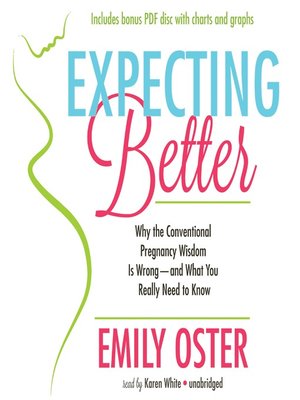Expecting Better
audiobook (Unabridged) ∣ Why the Conventional Pregnancy Wisdom Is Wrong--and What You Really Need to Know · ParentData
By Emily Oster

Sign up to save your library
With an OverDrive account, you can save your favorite libraries for at-a-glance information about availability. Find out more about OverDrive accounts.
Find this title in Libby, the library reading app by OverDrive.



Search for a digital library with this title
Title found at these libraries:
| Library Name | Distance |
|---|---|
| Loading... |
An award-winningsocial scientist uses the tools of economics to debunk myths about pregnancyand to empower women to make better decisions while they're expecting.
Pregnancy is full of rules. Pregnant women are often treatedas if they were children, given long lists of items to avoid—alcohol, caffeine,sushi—without any real explanation from their doctors about why. They hearfrightening and contradictory myths from friends and pregnancy books about everything from weight gain tosleeping on your back to bed rest. EconomistEmily Oster believes there is a better way. In Expecting Better, she shows that the information given to pregnantwomen is sometimes wrong and almost always oversimplified, and she debunks ahost of standard recommendations on everything from drinking to fetal testing.
When Oster was expecting her first child, she felt powerlessto make the right decisions. How doctors think and what patients need are twovery different things. So Oster drew on her own experience and went in searchof the real facts about pregnancy using an economist's tools. Economics is notjust a study of finance. It's the science of determining value and making informeddecisions. To make a good decision, you need to understand the informationavailable to you and to know what it means to you as an individual.
Take alcohol. We all know that Americans are cautious aboutdrinking during pregnancy. Official recommendations call for abstinence. ButOster argues that the medical research doesn't support this; the vast majorityof studies show no impact from an occasional drink. The few studies that docondemn light drinking are deeply flawed, including one in which the lightdrinkers were also heavy cocaine users.
Expecting Better overturns standard recommendations for alcohol,caffeine, sushi, bed rest, and induction while putting in context the blanketguidelines for fetal testing, weight gain, risks of pregnancy over the age ofthirty-five, nausea, and more. Oster offers the real-world advice onewould never get at the doctor's office. The health of your baby isparamount, and with this practical guide readers can know more and worry less. Having the numbers is atremendous relief—and so is the occasional glass of wine.







